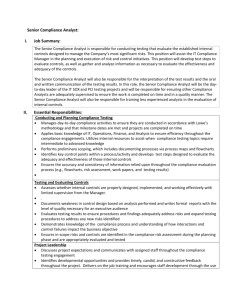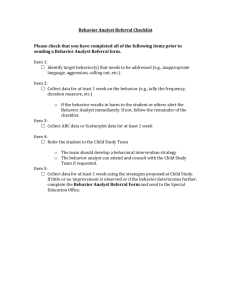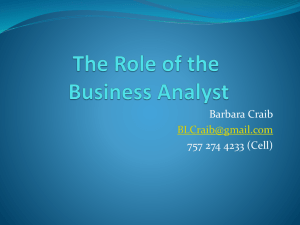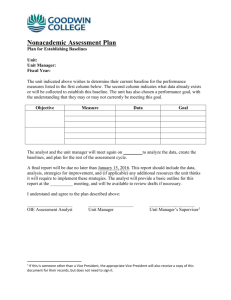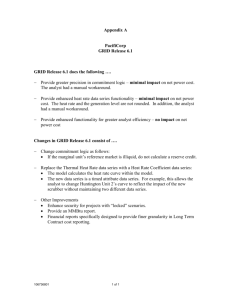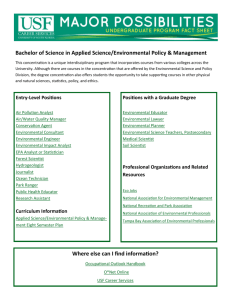EU Forum Report 04-09-03 Annex 4
advertisement
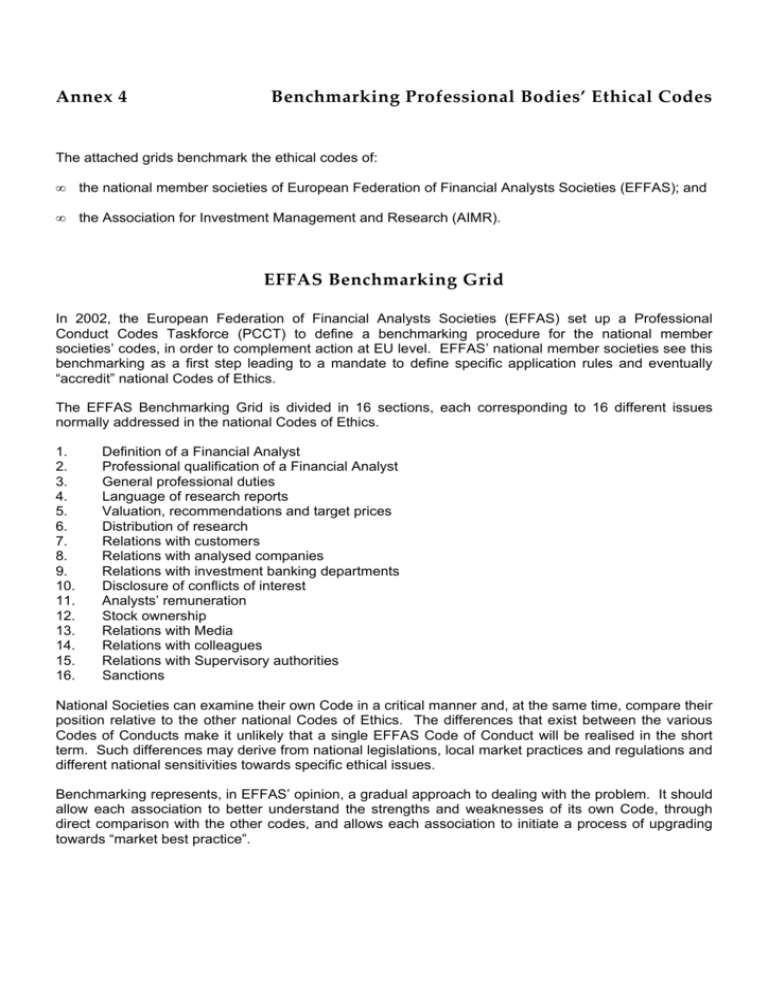
Annex 4 Benchmarking Professional Bodies’ Ethical Codes The attached grids benchmark the ethical codes of: • the national member societies of European Federation of Financial Analysts Societies (EFFAS); and • the Association for Investment Management and Research (AIMR). EFFAS Benchmarking Grid In 2002, the European Federation of Financial Analysts Societies (EFFAS) set up a Professional Conduct Codes Taskforce (PCCT) to define a benchmarking procedure for the national member societies’ codes, in order to complement action at EU level. EFFAS’ national member societies see this benchmarking as a first step leading to a mandate to define specific application rules and eventually “accredit” national Codes of Ethics. The EFFAS Benchmarking Grid is divided in 16 sections, each corresponding to 16 different issues normally addressed in the national Codes of Ethics. 1. 2. 3. 4. 5. 6. 7. 8. 9. 10. 11. 12. 13. 14. 15. 16. Definition of a Financial Analyst Professional qualification of a Financial Analyst General professional duties Language of research reports Valuation, recommendations and target prices Distribution of research Relations with customers Relations with analysed companies Relations with investment banking departments Disclosure of conflicts of interest Analysts’ remuneration Stock ownership Relations with Media Relations with colleagues Relations with Supervisory authorities Sanctions National Societies can examine their own Code in a critical manner and, at the same time, compare their position relative to the other national Codes of Ethics. The differences that exist between the various Codes of Conducts make it unlikely that a single EFFAS Code of Conduct will be realised in the short term. Such differences may derive from national legislations, local market practices and regulations and different national sensitivities towards specific ethical issues. Benchmarking represents, in EFFAS’ opinion, a gradual approach to dealing with the problem. It should allow each association to better understand the strengths and weaknesses of its own Code, through direct comparison with the other codes, and allows each association to initiate a process of upgrading towards “market best practice”. Annex 4 The Codes of Ethics and Standards of Professional Conduct of the EFFAS Member Societies are based on the principles of the International Council of Investment Analysts (ICIA), a global organisation that includes all analyst societies, and which was set up to formulate fundamental principles and values for achieving high standards of integrity and professional excellence for its members. The members of the EFFAS Societies are not limited to financial analysts but include the whole range of investment professionals and capital markets experts. Every individual member, regardless of whether they hold a CEFA or CIIA designation or not, must abide by the Codes and Standards of Ethics and of Professional Conduct. They should be seen as additional to the requirements of existing Community legislation. For practical guidance and interpretation of the principles expressed in the Codes of Conduct, Member Societies publish, on an ongoing basis, practice handbooks that assist members in acting according to the responsibilities to which they have committed themselves in acknowledging the respective Code of Conduct. Possible sanctions differ from Society to Society, but in all cases they comply with, and are subject to, local legislation. There are EFFAS societies in the following countries: Austria, Belgium, Finland, France, Germany, Greece, Hungary, Ireland, Italy, Luxembourg, the Netherlands, Norway, Poland, Portugal, Spain, Sweden, Switzerland, Russia and Ukraine. 2 Annex 4 BEL ITA FRA GER HOL Yes No Yes No Yes Yes Yes No No Yes Yes Yes Yes Yes Yes Yes Yes Yes Yes Yes HUN LUX NOR POL POR SWI SPA SWE UKR No No Yes No Yes Yes Yes Yes Yes No Yes No Yes No Yes Yes Yes Yes Yes Yes Yes Yes Yes Yes Yes Yes Yes Yes Yes Yes Yes Yes Yes Yes Yes Yes Yes Yes Yes Yes Yes No No No Yes No No Yes 1. Definition of a Financial Analyst The Code of Ethics has an explicit definition of financial analyst The exercise of the profession is subject to formal/legal registration a b c d e The definition includes: - those producing research reports only (eg. investment analysts) - the above plus portfolio managers - the above plus investment advisers (eg. financial planners) - the above plus brokers and intermediaries - any natural person whose activity can influence investment decisions in financial markets (e.g. finance managers, accountants, etc) Yes Yes Yes Yes Yes Yes 2. Professional qualification of a Financial Analyst a b c d e Have a university degree Pass professional certification accepted at the national level Pass professional certification accepted at the international level Have enough experience in the specific professional area f Be member of national professional association and follow national and international codes of professional conduct Improve and maintain professional skills constantly g Yes Yes Yes Yes Yes Yes Take an active role in professional community activities and exchange experience with colleagues Yes Yes Yes Yes Yes Yes Yes Yes Yes Yes Yes Yes No Yes Yes Yes Yes Yes Yes Yes Yes Yes Yes Yes Yes Yes Yes Yes Regl Yes Yes Yes Yes Regl Yes Yes Yes Regl Yes Regl Yes Regl Yes Yes Yes Yes Yes Yes Yes Yes Yes Yes Yes Yes Yes Yes Yes Yes Yes Yes Yes Yes Yes Yes Yes Yes Yes Yes Yes Yes Yes 3. General professional duties a b c d e f g h i Perform your tasks objectively and independently Perform your duties with diligence and thoroughness Accept a task only in accordance to qualification and experience Employ state-of-the-art procedures, resources and efforts needed for proper results Use maximum of skills and knowledge Open information for public only in agreement with customers Act only in accordance with international and national law Use reliable and multiple information sources to perform your tasks Do not publish research results under your own name that do not comply with your personal opinions Yes Yes Yes Yes Yes 3 Yes Yes Yes Yes Yes Yes Yes Yes Yes Yes Yes Yes Yes Yes Yes Yes Yes Yes Yes Yes No Yes Yes Yes Yes Yes Yes Yes Yes Yes Yes Yes Yes Yes Yes Yes Yes Yes Yes Yes Yes Yes Yes Yes Yes Yes Yes Yes Yes Yes Annex 4 BEL ITA FRA GER HOL HUN LUX NOR POL Yes Yes Yes Yes Yes Yes Yes Yes Yes Yes Yes Yes Yes Yes Yes Yes Regl Yes Yes Yes Yes Yes Yes Yes Yes Yes Regl Yes Yes POR SWI SPA SWE UKR Yes Yes Yes Yes Yes Yes Yes Yes Yes Yes Yes Yes Yes Yes Yes Yes Yes Yes Yes Yes Yes Yes Yes Yes Yes Yes Yes 4. Language of research reports a b c d e f g Be clear and understandable for the client Avoid misinterpretation of the same statement or conclusion Avoid guarantees of investment performance and promissory statements Yes Yes Avoid inflammatory points Statements and conclusions have to be supported by reasonable facts and inputs References to external sources of information are to be present No advertising elements to be present Yes Yes Yes Yes Yes Yes Yes Yes 5. Valuation, recommendations and target prices a b Distinguish between facts and opinions/suggestions, hard figures and estimates Publish valuation methods utilised c d e f g Yes Yes Yes Yes If Multiples are used: - list peer group - explain definition(s) of earnings - explain multiples used Yes Yes Yes Yes Yes Yes If DCF is used: - publish complete time series of earnings Yes - publish definitions and calculations of Cash Flow, Cost of Capital and Terminal Value Yes Yes h Indicate when deviating from generally accepted principals, explain how and why Yes Yes i Recommendations have to be clear and easily understandable by targeted customers Definition of each rating must be consistent with its plain meaning Recommendations have to be consistent with argument of the analysis j k l m n Yes Yes Yes Disclose material facts/risks that are adverse to your recommendation Be consistent when making judgement and value statements, irrespective of if audience is external, internal or private Maintain appropriate records Yes Regl Regl Yes Yes Yes 4 Yes Yes Yes Yes Yes Yes Yes Yes Yes Yes Regl Yes Yes Yes Yes Yes Yes Yes Yes Yes Yes Yes Yes Yes Yes Yes Annex 4 BEL ITA FRA GER HOL HUN LUX NOR POL POR SWI SPA Yes Yes Yes Yes SWE UKR 6. Distribution of research a b c d e f g h i Use reasonable judgement when disseminating information Do not release research to third parties before releasing them to clients Avoid selective distribution to specific customers Do not manipulate prices of securities through selective distribution Regl Yes Yes Take special care when information is disseminated through channels open for the general public Yes When shortened versions of an analysis/report are released: - indicate incompleteness (pointing to the original source) - disclose potential conflicts of interest Yes Yes Yes Yes Yes - make sure that valuations and recommendations are identical to those of the complete version Do not release information that does not comply with legal requirements and your Code of Ethics Regl Yes Yes Yes Yes Yes Yes Yes Yes Yes Yes Yes Yes Yes Regl Yes Yes Yes Yes Yes Yes Yes Yes Yes Yes Yes Yes Yes Yes Yes Yes Yes Yes Yes Yes Yes Yes Yes Yes Yes Yes Yes Regl Regl Yes Regl Regl Yes Yes Yes Yes Yes Yes Yes Yes Yes Yes Yes Regl Yes Yes Yes Yes Yes Regl Regl Regl Yes Yes Yes Yes Yes Yes Yes Yes Yes Yes Yes Yes Yes Yes Yes 7. Relations with customers a b c d e f g h i j k l m n Clients’ interest always to come first Deal fairly when offering financial services to actual/potential customer When visiting a client announce purpose of the visit in advance Know his needs, financial situation and the degree of professionalism Yes Yes Indicate clearly the features of an investment to prospective clients Consider appropriateness of recommendations with regard to the clients’ investment objectives and portfolio When advising customers, always be forthright and honest. Secure suitability of advice for client Offer informed advice Yes Do not serve two or more competing clients on sensitive issues without their knowledge Do not claim to provide independent advice if untrue Yes Give clients adequate opportunity to act on recommendation before acting on own/employer behalf (priority rules) Provide written detailed agreement with client Keep confidentiality on information obtained from clients Yes Yes Yes Yes Yes Yes Yes Yes Yes Yes Yes Yes Yes Yes Yes Yes Yes Yes Yes Yes Yes Yes Yes Yes Yes Yes No Yes Yes Yes Yes Yes Yes Yes Yes 5 Yes Regl Yes Regl Yes Yes Yes Yes Yes Yes Yes Yes Yes Yes Yes Yes Yes Yes Yes Yes Yes Yes Yes Yes No Yes Annex 4 BEL ITA FRA GER HOL HUN LUX NOR POL POR SWI SPA SWE UKR 8. Relations with analysed companies a Know the company: their business, performance, financials, their ethics and agenda in communicating with analysts b Agree scope of research assignment with analysed companies in advance, possibly in writing Disclose all potential conflicts of interest in relation to other companies analysed by the same analysts, investment-banking assignments, etc. Yes d Avoid, if possible, entering into assignments if conflict exists; if conflict arises during assignment, then refer to your supervisors Yes e Do not accept any gift, entertainment, other, which could influence your objective judgement Do not submit draft of research reports before publication Only submit draft without recommendations c f g h Yes Yes Yes Yes No Regl Yes Yes Yes Yes Yes Yes Yes Yes Yes Yes Yes Yes Yes Yes Yes Yes Yes Yes Yes Yes Yes Yes No Yes Yes Yes Yes Yes Keep written/recorded documentation of key communication, including time stamping Yes Yes Yes Yes Yes 9. Relations with investment banking departments a Do not allow investment-banking relationship/business with their clients to influence analysts' recommendation, to be performed objectively. b c d e f g Yes Yes Regl Research analysts should not report to investment-banking departments Yes Yes Ensure that your company's have a written policy in place on how to take an analyst over the "Chinese Wall", when assigned to an investment banking deal, and stick to it (*) Yes Regl Yes When in doubt if an action is ethical or not the analyst should contact his/her superior or the Compliance Officer Yes Yes Yes Yes Regl Yes Regl Yes Yes Yes Regl No communication with analysts in relation to the Corp Finance assignment should take place before cleared by the Compliance Officer (**) All communication with Investment Banking Department to be kept confidential vis-à-vis third parties, either external or internal Keep a written record of any relevant communication between Investment Banking Department and analyst. Yes Yes Regl Yes No Yes Regl Regl Regl (*) This policy should ensure that there is no conflict of interest in the way the analyst covers the company whilst the firm and analyst is being assigned to a corporate finance deal. (**) An independent party such as the compliance officer should be the key link in lifting the analyst over the "Chinese Wall" and should keep a written, time-logged documentation of all such events 6 Annex 4 BEL ITA FRA GER HOL HUN LUX NOR POL POR SWI SPA SWE UKR Yes Yes Yes Regl Yes Yes Yes Yes Yes Yes Yes Yes Yes Yes Yes Yes Yes Regl Yes Yes Yes Yes Yes Yes Yes Yes Yes Yes Yes Yes Yes Yes Yes Yes Yes 10. Disclosure of conflicts of interest a b Take reasonable steps to avoid conflicts of interests. If in any doubt regarding possible conflicts of interests, inform supervisors c Disclose clients in advance all matters reasonably expected to impair your advice If conflicts of interests arise during a task, ensure fair treatment/information to clients by disclosure Do not perform transactions or tasks for clients, if you have material interest in the transaction Pursue implementation into your company of procedures to prevent/resolve conflicts of interests d e f g h Yes Yes Yes Yes Yes Yes Inform superiors of any form of pressure in the course of professional duties Written disclosure in research reports have to be done prominently (front page, or a clear indication given on the front page in bold) Yes Yes Yes Yes Yes Yes Yes Yes Yes Yes Yes Yes 11. Analysts' remuneration a Do not accept any formula-based or other links between the analysts’ compensation and results of the investment-banking department b Remuneration to be based mainly on analyst's recommendation performances Do not accept any pre-IPO stocks in companies analysed Do not accept any payment or any other benefits from the analysed company that could impair judgement/advice Charge reasonable fees, not contingent on results Refrain from ”soft” commissions c d e f g Yes Yes Yes Yes Yes Yes No Yes No Yes Yes Yes Yes Yes Yes Yes Yes Yes Yes Yes Yes Yes Yes Yes Yes Yes Disclose monetary compensation or other benefits related to a specific task, when required by circumstances Yes Yes Yes Yes No Yes Yes Yes 12. Stock ownership a b c d e f Stock ownership allowed, subject to full disclosure to customers No ownership allowed in shares, covered by analyst’s research Refrain from dealing in shares in all company to be researched Never act against your recommendation, except for clear personal necessity Abstain from trading in determined periods, before and after publication of research on a stock owned by analyst When dealing for own account, always subordinate to clients’ interest Yes Yes Yes Yes Yes Regl 7 Yes Yes Yes Yes Yes Yes Yes Yes Yes Yes Yes Yes Yes Yes Yes Annex 4 BEL ITA FRA GER HOL HUN LUX NOR POL POR SWI SPA SWE UKR 13. Relations with Media a b c d e f Follow in first instance your company's written media policy Yes Act in a way which would enhance the credibility of the analyst profession and of your firm in the marketplace Yes Yes Yes Yes Yes Yes Regl Yes Yes Yes Do not disclose through media channels any research reports, or part of them, or information which could influence the price of a stock, unless already made public Only express opinions about stocks covered by the analyst Never express opinions about a security in conflict with what was written in recent research reports on that specific security Never disclose or even hint at any confidential information; in doubt say nothing Yes Yes Yes Yes Yes Yes Yes Yes Yes Yes Yes Yes Yes Yes Yes Yes Yes Yes Yes Yes Yes Yes Yes Yes Yes Yes Yes Yes Yes Yes Yes Yes Yes Yes Yes Yes Yes Yes Yes Yes Yes Yes 14. Relations with colleagues a b c d Behave correctly with your colleagues Yes Offer help/ advice to colleagues in case connected with profession, unless this could hurt clients’ or employers’ interests Promote professional qualification of your colleagues Yes Do not play unfair competition with colleagues, avoiding any public discredit to them Yes e In particular, do not discredit nor disparage investment recommendations issued by competitors in front of third parties f Address critics personally to your colleagues or, in determined circumstances, through the Association. Inform colleagues about the Code of Conduct to which the analyst is subject g Yes Yes Yes Yes Yes Yes Yes Yes Yes Yes Make your best efforts so that your colleagues respect the same principles Yes Yes Yes Yes Yes i Do not participate nor assist a business conduct from a fellow member that is, or could be, in violation of standard rules of conduct. Yes Yes Yes Yes Yes j Denounce such violations from other members of the professions to the National association Yes k Settle controversies with colleagues about the Code of Conducts through the Association Leader and leaders responsibility/ The financial analyst is obliged to act on the Society's Code of Ethics/ A leader (manager) is obliged to look after that his staff will act on the Society's Code of Ethics Yes l Yes Yes h 8 Yes Yes Yes Yes Yes Yes Yes Yes Yes Yes Yes Yes Yes Yes Yes Annex 4 BEL ITA FRA Yes Yes Yes GER HOL HUN LUX NOR POL POR SWI Yes Yes No Yes Yes Yes SPA SWE UKR 15. Relations with Supervisory authorities a b c d e f g Always offer full cooperation if required to co-operate with Supervisory Authorities as an expert in any procedure, both individually and by means of the National Associations Provide detailed information about the operating professional context Provide collaboration in the making of regulatory rules Be transparent vs. the Authority when a procedure is in the making, abstaining from any ambiguous behaviour Comply with self-regulatory rules, in addition to general ones Communicate relevant infringements detected in professional activity Collaborating with the authorities to amend infringements Yes Yes Yes Yes Yes Yes Yes Yes Yes Yes Yes No Yes No Yes Yes Yes Yes Yes Yes Yes Yes Yes Yes Yes Yes Yes Yes Yes Yes Yes Oblgt Yes Yes Yes Yes 16. Sanctions The National Code of Ethics has an explicit system of sanctions No Infringements a b c d e f g h i j k l Charge infringements only to natural persons If infringement is carried our by legal entities, charge those members who adopted decisions Consider only infringements undertaken during professional duties Do not consider those due to errors or accidental lack of knowledge Yes No Yes Yes Yes Yes Determine the degree of the infringement with regard to: - the damage made to investor - the damage to proper market functioning - the level of investor's capability - the number of investors damaged - the accessibility to markets - the repetition of infringements - the consciousness deliberated and organised punishable acts undertaking - the benefit obtained by the violator Yes Yes Yes Yes Yes Yes Yes Yes Yes Yes Yes Yes Sanctions m n o p q Determine the degree of sanction as follows: - private warning - public warning - temporary suspension from the Association - definitive lending-off from The Association Allow for rehabilitation, accomplishing certain requirements, such as the pay-back of the unduly obtained benefits and compensation of injured party Yes Yes Yes Yes Yes Yes Yes Yes Yes Yes Yes Yes Yes Yes Yes Yes Yes Yes Yes Regl – regulated by law Oblgt – obligatory ITALY – As of July 2003, the Italian Parliament was approving a law regulating the profession of financial analyst. 9 Yes Yes Yes Yes Yes Yes Yes Yes Yes Yes Yes Yes Yes Yes Yes Yes Yes Yes Yes Yes Yes Annex 4 AIMR Code of Ethics and Standards of Professional Conduct applied to the EFFAS Benchmarking Grid The Association for Investment Management and Research (AIMR) Code of Ethics and Standards of Professional Conduct are a fundamental element of AIMR’s values and an essential tool in achieving its mission of setting high standards of education, integrity, and professional excellence. They are closely linked to the principles of the International Council of Investment Analysts (ICIA), a global organisation that includes all analyst societies. All AIMR members, who comprise the full range of investment professionals (including every holder of the Chartered Financial Analyst® (CFA®) designation), and all CFA candidates, must abide by the Code and Standards. Within Europe, the Code and Standards apply to AIMR’s affiliated societies in Austria, Bulgaria, Czech Republic, Denmark, Finland, France, Germany, Greece, Hungary, Italy, Luxembourg, the Netherlands, Romania, Ireland, Spain, Sweden, Switzerland, Turkey and the United Kingdom. While the Code and Standards provide AIMR members with the basic tenets that they must follow to practice in an ethical and professional manner, in addition to compliance with relevant laws and regulation, AIMR publishes the Standards of Practice Handbook (SOPH) that provides authoritative guidance, interpretation, recommended procedures for compliance and application examples to assist members in understanding their responsibilities under the Code and Standards. In applying the Code and Standards to the EFFAS Benchmarking Grid (below), the relevant provision of the Code and Standards that covers each category is cited. When a provision is listed, the Code and Standards address the category although more specific guidance can be found in the SOPH. Categories that are not covered by the EFFAS Benchmarking Grid but which are addressed by the Code and Standards appear in italics. 10 Annex 4 1. Definition of a Financial Analyst AIMR’s Code and Standards are not limited in scope to the professional activities of financial analysts. Rather, AIMR has written the Code and Standards to be applicable to the broader audience of investment professionals in general. All AIMR members, including CFA Charterholders, as well as candidates in the CFA program, regardless of their professional activities, must abide by the Code and Standards. As a result, the Code and Standards reaches a variety of specialties in the investment profession including, financial analysts, portfolio managers, brokers, bankers, and financial advisers. 2. Professional qualification of a Financial Analyst AIMR’s Code and Standards does not prescribe particular qualifications for an individual to become a financial analyst but AIMR’s membership rules prescribe a certain level of investment experience and formal education. AIMR members who hold the CFA designation must pass a series of three rigorous examinations as well as meet certain work experience qualifications to earn their Charter. 3. General professional duties a b c d Perform your tasks objectively and independently Perform your duties with diligence and thoroughness Accept a task only in accordance with qualification and experience Employ state-of-the-art procedures, resources and efforts needed for proper results e Use maximum of skills and knowledge f Open information for public only in agreement with customers g Act only in accordance with international and national law h Use reliable and multiple information sources to perform your tasks i Do not publish research results under your own name that do not comply with your personal opinions Do not engage in any professional conduct involving dishonesty, fraud, deceit, or misrepresentation Do not commit any act that reflects adversely on their honesty, trustworthiness, or professional competence IV(A.3) IV(A.1) Code of Ethics Code of Ethics Code of Ethics IV(B.5) I(A) IV(A.1.b) IV(A.1), IV(A.2) II(B.1) II(B.1) 4. Language of research reports a b c d e Be clear and understandable for the client Avoid misinterpretation of the same statement or condition Avoid guarantees of investment performance and promissory statements Avoid inflammatory points Statements and conclusions have to be supported by reasonable facts and inputs f References to external sources of information are to be present g No advertising elements to be present 11 IV(A.1.c) IV(B.6) IV(A.1.b) II(C) Annex 4 5. Valuation, recommendations and target prices a Distinguish between facts and opinions/suggestions, hard figures, and estimates b Publish valuation methods utilized IV(A.2), IV(B.2.c) IV(B.2.d) If Multiples are used: c - list peer group d - explain definition(s) of earnings e - explain multiples used IV(B.2.d) IV(B.2.d) IV(B.2.d) If DCF is used: f g - publish complete time series of earnings - publish definitions and calculations of Cash Flow, Cost of Capital and Terminal Value h Indicate when deviating from generally accepted principles, explain how and why i Recommendations have to be clear and easily understandable by targeted customers j Definition of each rating must be consistent with its plain meaning k Recommendations have to be consistent with argument of the analysis l Disclose material facts/risks that are adverse to your recommendation m Be consistent when making judgment and value statements, irrespective of whether audience is external, internal, or private n Maintain appropriate records IV(B.2.d) IV(B.2.d) IV(B.2.d) IV(B.2.d) IV(A.1) IV(A.2.a), IV(B.2.d) IV(A.1), IV(B.3) IV(A.1.d) 6. Distribution of research a b c d e Use reasonable judgment when disseminating information Do not release research to third parties before releasing them to clients Avoid selective distribution to specific customers Do not manipulate prices of securities through selective distribution Take special care when information is disseminated through channels open for the general public IV(B.3), IV(A.3) IV(B.3) IV(B.3) IV(B.3) IV(B.3), IV(A.3) When shortened versions of an analysis/report are released: f - indicate incompleteness (pointing to the original source) g - disclose potential conflicts of interest h - make sure that valuations and recommendations are identical to those of the complete version i Do not release information that does not comply with legal requirements and your Code of Ethics 12 IV(B.7) IV(B.3) I(A) Annex 4 7. Relations with customers a b c d e f Clients’ interest always to come first Deal fairly when offering financial services to actual/potential customer When visiting a client announce purpose of the visit in advance Know his needs, financial situation and the degree of professionalism Indicate clearly the features of an investment to prospective clients Consider appropriateness of recommendations with regard to the clients’ investment objectives and portfolio g When advising customers, always be forthright and honest h Secure suitability of advice for client i Offer informed advice j Do not serve two or more competing clients on sensitive issues without their knowledge k Do not claim to provide independent advice if untrue l Give clients adequate opportunity to act on recommendation before acting on own/employer behalf (priority rules) m Provide written detailed agreement with client n Keep confidentiality on information obtained from clients Update clients financial information and investment objectives as necessary but no less frequently than annually Make no recommendation unless it is suitable to the client’s financial situation, investment experience, and investment objectives Disclose to clients the basic format and general principles of the investment processes by which securities are selected and portfolios are constructed IV(B.1) IV(B.3) IV(B.2) IV(B.2.d) IV(B.2.b) II(B.1) IV(B.2) IV(A.1.b) IV(B.3) IV(B.6) IV(B.4) IV(B.5) IV(B.2.a) IV(B.2.b) IV(B.2.d) 8. Relations with analysed companies a Know the company: their business, performance, financials, their ethics and agenda in communicating with analysts b Agree scope of research assignment with analyzed companies in advance, possibly in writing c Disclose all potential conflicts of interest in relation to other companies analysed by the same analysts, investment-banking assignments, etc. d Avoid, if possible, entering into assignments if conflict exists; if conflict arises during assignment, then refer to your supervisors e Do not accept any gift, entertainment, other, which could influence your objective judgment f Do not submit draft of research reports before publication g Only submit draft without recommendations h Keep written/recorded documentation of key communication, including time stamping 13 IV(A.1) IV(B.7) IV(A.3) IV(A.3) IV(A.3) IV(A.3) IV(A.1) Annex 4 9. Relations with investment banking departments a Do not allow investment-banking relationship/business with their clients to IV(A.3) influence analysts’ recommendation, to be performed objectively b Research analysts should not report to investment-banking departments IV(A.3) c Ensure that your companies have a written policy in place on how to take an IV(A.3) analyst over the “Chinese Wall,” when assigned to an investment-banking deal, and stick to it d When in doubt if an action is ethical or not the analyst should contact his/her I(A) supervisor or the Compliance Officer e No communication with analysts in relation to the Corp Finance IV(A.3) assignment should take place before cleared by the Compliance Officer f All communication with Investment Banking Department to be kept IV(A.3) confidential vis-á-vis third parties, either external or internal g Keep a written record of any relevant communication between Investment IV(A.3) Banking Department and analyst 10. Disclosure of conflicts of interest a Take reasonable steps to avoid conflicts of interest b If in any doubt regarding possible conflicts of interests, inform supervisors c Disclose clients in advance all matters reasonably expected to impair your advice d If conflicts of interests arise during a task, ensure fair treatment/information to clients by disclosure e Do not perform transactions or tasks for clients, if you have material interest in the transaction f Pursue implementation into your company of procedures to prevent/resolve conflicts of interests g Inform supervisors of any form of pressure in the course of professional duties h Written disclosure in research reports have to be done prominently (front page, or a clear indication given on the front page in bold) Disclose any consideration or benefit received or delivered to others for the recommendation of any services to the client Do not undertake any independent practice that could result in compensation or other benefit in competition with their employer unless consent from all parties is obtained Disclose all monetary compensation or other benefits received for services in addition to compensation conferred by an employer Comply with any prohibitions on activities imposed by their employer if a conflict of interest exists 14 IV(A.3) III(C) IV(B.7) IV(B.7) IV(B.1) IV(B.8) III(B) III(D) III(C.2) Annex 4 11. Analysts’ remuneration a Do not accept any formula-based or other links between the analysts’ compensation and results of the investment-banking department b Remuneration to be based mainly on analyst’s recommendation performances c Do not accept any pre-IPO stocks in companies analysed d Do not accept any payment or any other benefits from the analysed company that could impair judgment/advice e Charge reasonable fees, not contingent on results f Refrain from “soft” commissions g Disclose monetary compensation or other benefits related to a specific task, when required by circumstances IV(A.3) IV(A.3), IV(B.4) IV(A.3) IV(B.7), IV(B.8) 12. Stock ownership a b c d e f Stock ownership allowed, subject to full disclosure to customers No ownership allowed in shares, covered by analyst’s research Refrain from dealing in shares in all companies to be researched Never act against your recommendation, except for clear personal necessity Abstain from trading in determined periods, before and after publication of research on a stock owed by analyst When dealing for own account, always subordinate to clients’ interest Beneficial ownership includes having a direct or pecuniary interest in the investment, the power to direct voting of the shares, or the power to dispose of the investment IV(B.4), IV(B.7) IV(B.4), IV(B.7) IV(B.4) IV(B.4) 13. Relations with Media a Follow in first instance your company’s written media policy b Act in a way which would enhance the credibility of the analyst profession and of your firm in the marketplace c Do not disclose through media channels any research reports, or part of them, or information which could influence the price of stock, unless already made public d Only express opinions about stocks covered by the analyst e Never express opinions about a security in conflict with what was written in recent research reports on the specific security f Never disclose or even hint at any confidential information; if in doubt say nothing 15 Code of Ethics V(A) IV(B.5) Annex 4 14. Relations with colleagues a Behave correctly with your colleagues b Offer help/advice to colleagues in case connected with profession, unless this could hurt clients’ or employers’ interests c Promote professional qualification of your colleagues d Do not play unfair competition with colleagues, avoiding any public discredit to them e In particular, do not discredit nor disparage investment recommendations issued by competitors in front of third parties f Address critics personally to your colleagues or, in determined circumstances, through the Association g Inform colleagues about the Code of Conduct to which the analyst is subject h Make your best efforts so that your colleagues respect the same principles i Do not participate in nor assist a business conduct from a fellow member that is, or could be, in violation of standards rules of conduct j Denounce such violations from other members of the professions to the Association k Settle controversies with colleagues about the Code of Conducts through the Association l Leader and leaders responsibility/The financial analyst is obliged to act on the Society’s Code of Ethics/A leader (manager) is obliged to ensure that his staff will act on the Society’s Code of Ethics Code of Ethics Code of Ethics Code of Ethics Code of Ethics Code of Ethics Code of Ethics III (A) III (A), Code of Ethics I(B) III(E) 15. Relations with Supervisory authorities a Always offer full cooperation if required to co-operate with Supervisory Authorities as an expert in any procedure, both individually and by means of the National association b Provide detailed information about the operating professional conduct c Provide collaboration in the making of regulatory rules d Be transparent vs. the Authority when a procedure is in the making, abstaining from any ambiguous behavior e Comply with self-regulatory rules, in addition to general ones f Communicate relevant infringements detected in professional activity g Collaborating with the authorities to amend infringements 16 I(A) I(A) PCP Rules of Procedure Annex 4 Use of Credentials, Qualifications Do not misrepresent services you or your firm a capable of performing Do not misrepresent your qualifications or the qualifications of your firm Do not misrepresent academic credentials Reference AIMR membership, the CFA designation, and participation in the CFA program in a dignified and judicious manner IV(B.6) IV(B.6) IV(B.6) II(A) Use of Material Non-public Information Do not trade or cause others to trade on material non-public information in V(A) breach of a duty if the information was misappropriated or relates to a tender offer Make reasonable efforts to achieve public dissemination of material V(A) nonpublic information disclosed in breach of a duty Performance Presentation Do not make any statements that misrepresent the investment performance that they or their firms have accomplished or can reasonably be expected to achieve Make every reasonable effort to assure that investment performance history is communicated in a fair, accurate, and complete manner V(B.1) V(B.2) 16. Sanctions Every AIMR member (including every holder of the Chartered Financial Analyst® (CFA®) designation) and all CFA candidates must abide by the Code and Standards. The enforcement of the Code and Standards is the responsibility of AIMR’s Professional Conduct Program. AIMR members must file an annual Professional Conduct statement with the PCP, identifying any violations in which they may be involved. The PCP, through its Rules of Procedure and policies investigates all self disclosed violations, as well as those brought to the attention of the PCP by outside parties such as employers, regulators, clients and the media. All investigations resulting in a finding of misconduct result in a disciplinary sanction agreed to by the member or imposed by a disciplinary review committee composed of AIMR members. Sanctions range from a private censure to a revocation of membership, candidacy in the CFA Program, and the right to use the CFA designation. 17 Annex 4 Infringements a Charge infringements only to natural persons b If infringement is carried out by legal entities, charge those members who adopted decisions c Consider only infringements undertaken during professional duties d Do not consider those due to errors or accidental lack of knowledge AIMR Bylaws Determine the degree of the infringement with regard to: e f g h i j k l - the damage make to investor - the damage to proper market functioning - the level of investor’s capability - the number of investors damaged - the accessibility to markets - the repetition of infringements - the consciousness deliberated and organized punishable acts undertaking - the benefit obtained by the violator PCP Program Policies PCP Program Policies PCP Program Policies PCP Program Policies PCP Program Policies PCP Program Policies PCP Program Policies PCP Program Policies Sanctions Determine the degree of sanction as follows: m n o p q - private warning - public warning - temporary suspension for the Association - definitive lending-off from the Association Allow for rehabilitation, accomplishing certain requirements, such as the pay back of the unduly obtained benefits and compensation of injured party 18 PCP Rules of Procedure PCP Rules of Procedure PCP Rules of Procedure PCP Rules of Procedure PCP Rules of Procedure

